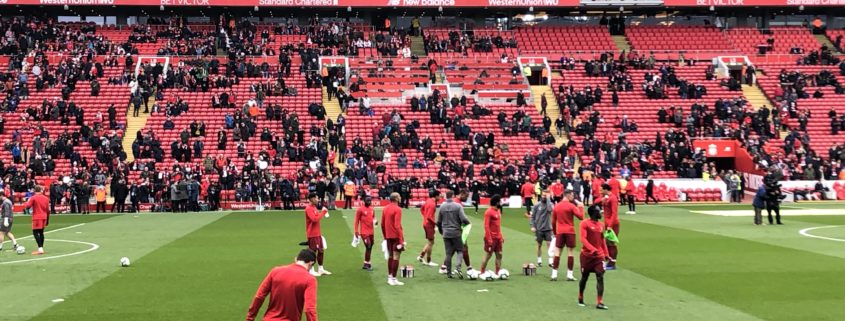Leadership, soccer coaching and Jurgen Klopp
Given I’ve spent a lot of time thinking, reading, planning (*) and watching Liverpool Football Club (LFC) this season, I figured I could at least use some of that familiarity to identify some learnings about leadership. I obviously have a bias, but I think Jurgen Klopp, Liverpool’s German coach exemplifies many characteristics that help leaders create great teams and challenge them to improve performance every year.
Simon Kuper and Stefan Szymanski point out in their book ‘Soccernomics’ that coaches don’t typically have a big impact on a club’s results – based on a few decades of research across several countries. A club’s payroll is a much stronger indicator of success. Prior to the Champions League Final (Europe’s premier club tournament), Simon Kuper wrote about this phenomenon again on ESPN FC, and interestingly he observed that Liverpool are one club outperforming others with higher payrolls. He did not comment on why – here’s where I would argue that Jurgen Klopp, may be a critical factor.
This would make Klopp an ‘overachiever’ in the original ‘Soccernomics’ analysis – and important to note, Kuper and Szymanski did identify some ‘overachievers’ in their study. His leadership style has some dimensions that seem unusual in the field of soccer management. Historically, coaches have been very dictatorial with their players and their teams, disdaining input from non-football people around analytics and diet. This seems to be changing at the top level, where managing a team of twenty-something millionaires presents another level to the challenge.
He is often talked about as a great motivator, but I think that understates his leadership qualities. So what does Klopp appear to do differently?
- Understanding players as people – he has said it’s important to understand his players first, before talking to them about football.
- His first question about potential new players is, apparently, what are they like as people? This is key to getting the right people on board. Early on Klopp allowed a star defender to leave, because of his disruptive influence.
- Allowing people to try things:
- Much was made of the improvisation that allowed Liverpool to score some key goals this season. His players have the freedom to try things, within the game plan that he and his coaches develop.
- Giving other people credit – in the latter case, he gave all the credit to the players involved.
- He once referred to his assistant (Zeljko Buvac) as ‘The brain’. Buvac left LFC last year, and this year the team improved tactically – suggesting that Klopp was happy to give credit to others, even when his role was the more significant.
- He recently called the players mental giants for their ability to keep winning at the end of the season.
- He does not take credit personally when results go well and does everything to avoid blaming his team in more difficult times
- Understanding where he is strong and where he could benefit from other expertise – diet, data, player acquisition are just some of the areas where he relies on others in the team.
- In recent weeks there’ve been several articles on the club’s data analysis team and their insights on which players to acquire for the team – Klopp isn’t always invested in these players at the start.
- These analysts are key in helping Klopp and team with preparation.
- Aligning with and building on the club’s strategy. Unlike many coaches he seems to embrace the limits set by the owners.
- His ability as a strategist is often understated. After last year’s near miss in The Champions League, he returned with a new plan of how the team was going to play, requiring major changes in his system – this resulted in a dramatic improvement in performance this season
- Honesty – an ex-Liverpool player who left the club as part of Klopp’s changes said last week that he was one of the best coaches he’d ever had because he’d explained what he needed and it was clear that the player (Christian Benteke) was not a good fit.
- Patience – this is a commodity in short supply in soccer. Coaches are changed out frequently. Yet, Klopp’s question to new players he’s trying to integrate into the squad is, are you here for 5 months or 5 years.?
I haven’t observed other English Premier League (EPL) coaches (Pep Guardiola or Mauricio Pochettino) as closely, but both appear to have more in common with Klopp than a coach like Jose Mourinho or Antonio Conte, both highly critical of players on their squads – who have left the EPL in the last 12 months.
So, what did I learn…. Kuper and Szymanski are skeptical of the premise that coaches are key to a team’s success. My take on Jurgen Klopp is that there’s potential for coaches who are skilled in identifying marginal improvements in their team and its performance, to become the overachiever described in Soccernomics. I think the wider implications for leaders in other fields – by adopting the approaches I’ve outlined above I think there’s significant opportunity for marginal and continuous improvements, leading to the creation of great teams.
*For those of you who don’t know, I’m the chairperson of the Official Liverpool Supporters Club in Delaware.


 302-559-8883
302-559-8883
 paulgaskell@onnupcoaching.com
paulgaskell@onnupcoaching.com








Leave a Reply
Want to join the discussion?Feel free to contribute!